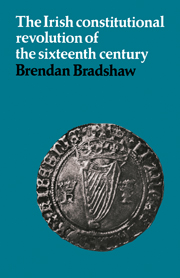Book contents
- Frontmatter
- Contents
- Dedication
- Preface
- Abbreviations
- Ireland about 1530
- PART I ‘A discourse of the cause of the evil state of Ireland and of the remedies thereof’
- PART II The reform of the Lordship in the era of Thomas Cromwell, 1530–40
- PART III The liberal revolution
- Introduction
- 7 The reform of the Irishry
- 8 The transformation of the Lordship
- 9 The origins of Irish political nationalism
- Bibliography
- Index
- Frontmatter
- Contents
- Dedication
- Preface
- Abbreviations
- Ireland about 1530
- PART I ‘A discourse of the cause of the evil state of Ireland and of the remedies thereof’
- PART II The reform of the Lordship in the era of Thomas Cromwell, 1530–40
- PART III The liberal revolution
- Introduction
- 7 The reform of the Irishry
- 8 The transformation of the Lordship
- 9 The origins of Irish political nationalism
- Bibliography
- Index
Summary
The mid-Tudor period is of epochal significance in Irish constitutional and political history. The early 1540s was the period when the crown at last embarked upon a policy of general reform in Ireland. It was also the period when the island's constitutional status was defined in terms of a sovereign kingdom, replacing the feudal notion of a lordship, and when the institutions of crown government began to be adapted to accord with a conception of the island's inhabitants as a single coherent political community. Within this constitutional framework the political history of early modern Ireland unfolds. All of these developments were associated with the promotion of the reform programme of commonwealth liberalism.
The reigns of Edward VI and Mary have their own unique significance. At the political level they saw, on the one hand, the disenchantment of the crown with the liberal experiment and its abandonment under Lord Deputy Sussex in 1556 and, on the other hand, the increasing commitment of the Anglo-Irish political establishment to it. This political tension was sharpened when the ideology of commonwealth liberalism – whose upholders were fated to become increasingly alienated from crown government – cross-fertilised with two other elements already present in the mental atmosphere of Anglo-Ireland. One was the traditional ideology of separatism, resistance to English domination; the other was a new sentiment of patriotism. In the opposition of commonwealth reformers to the new radical policies of the crown, the gestation of a new tradition of constitutional nationalism took place.
- Type
- Chapter
- Information
- The Irish Constitutional Revolution of the Sixteenth Century , pp. 189 - 192Publisher: Cambridge University PressPrint publication year: 1979



